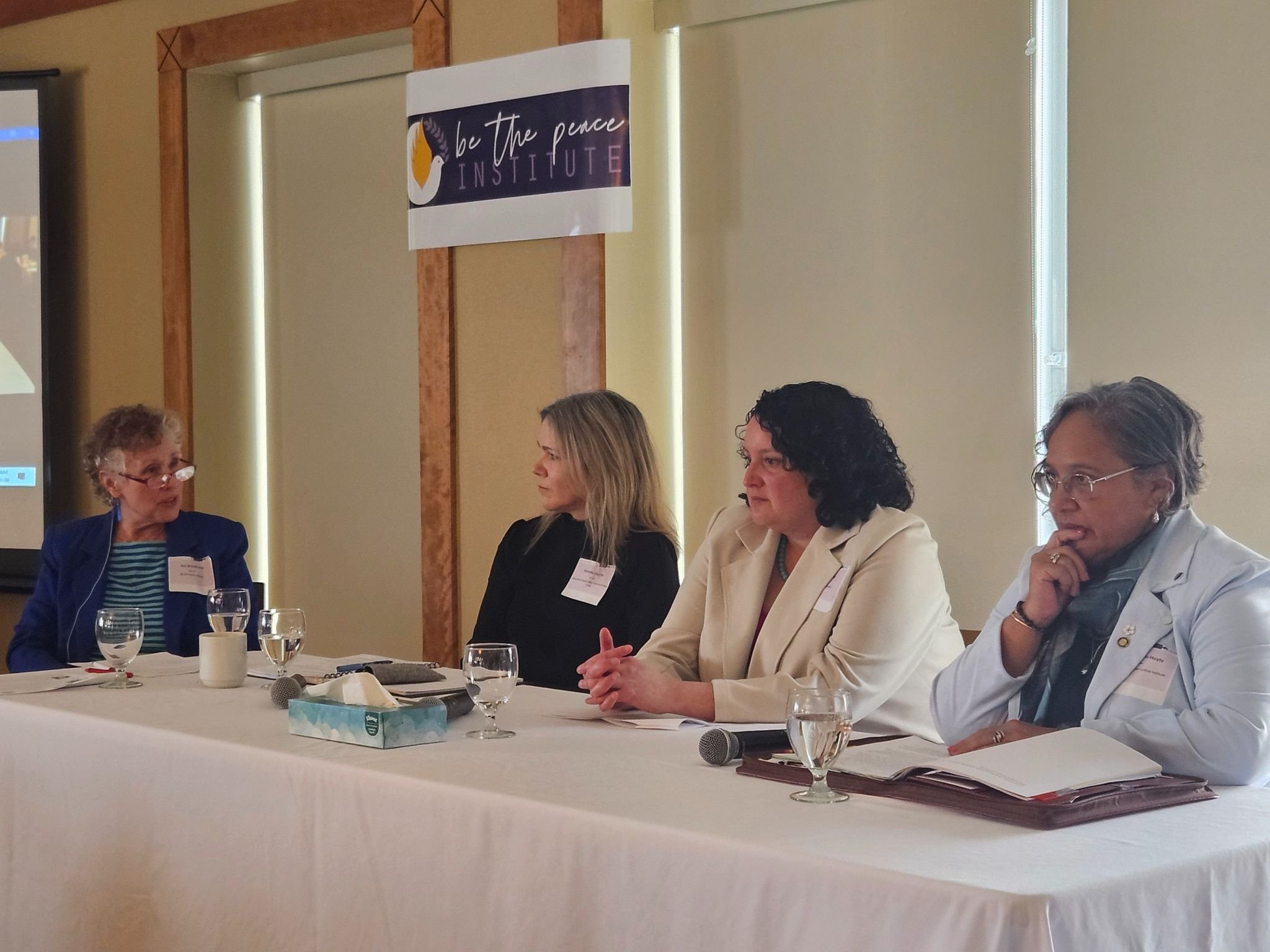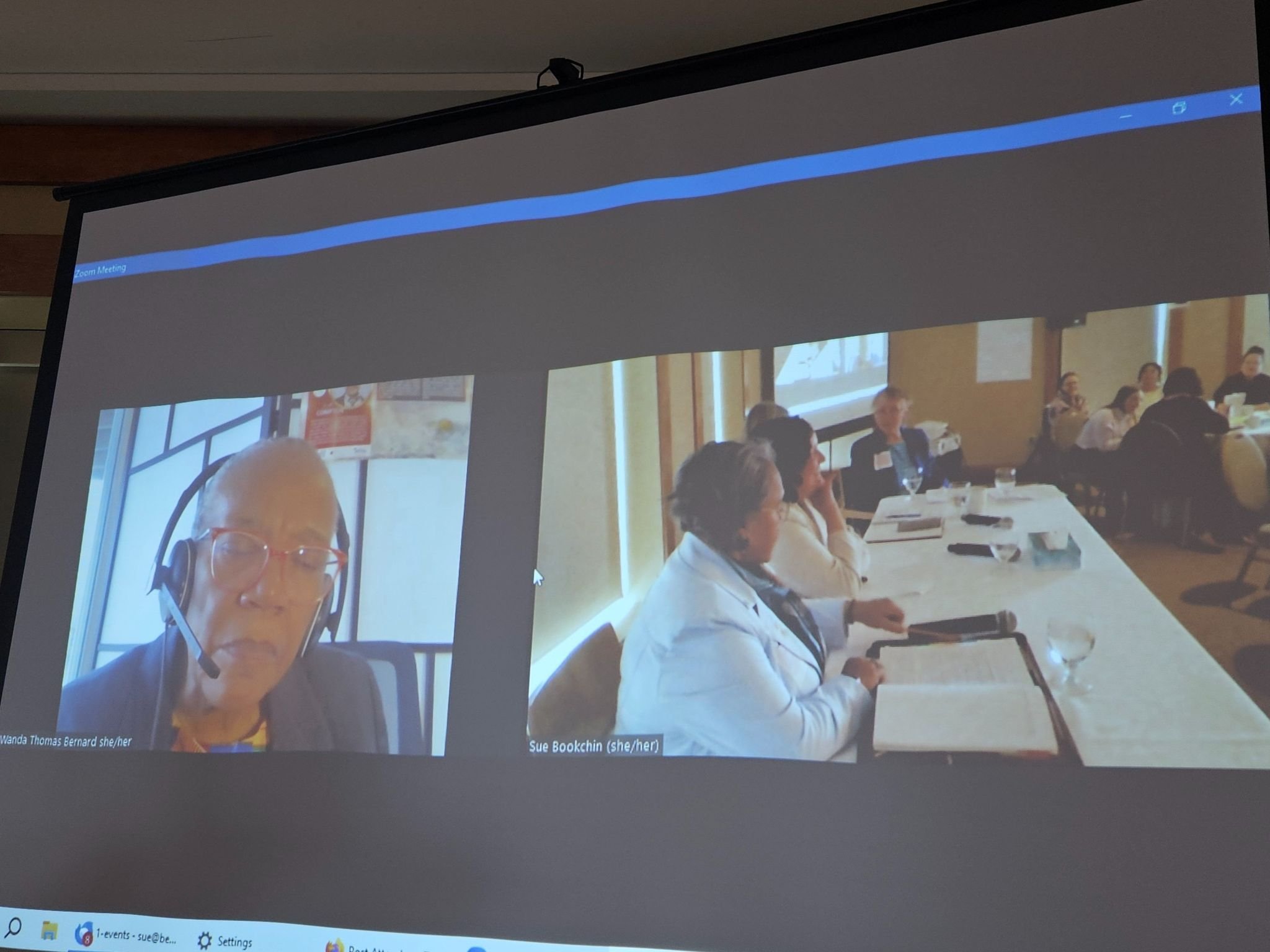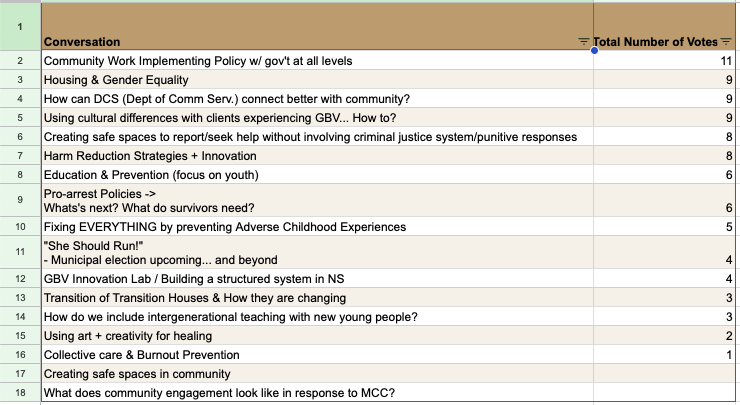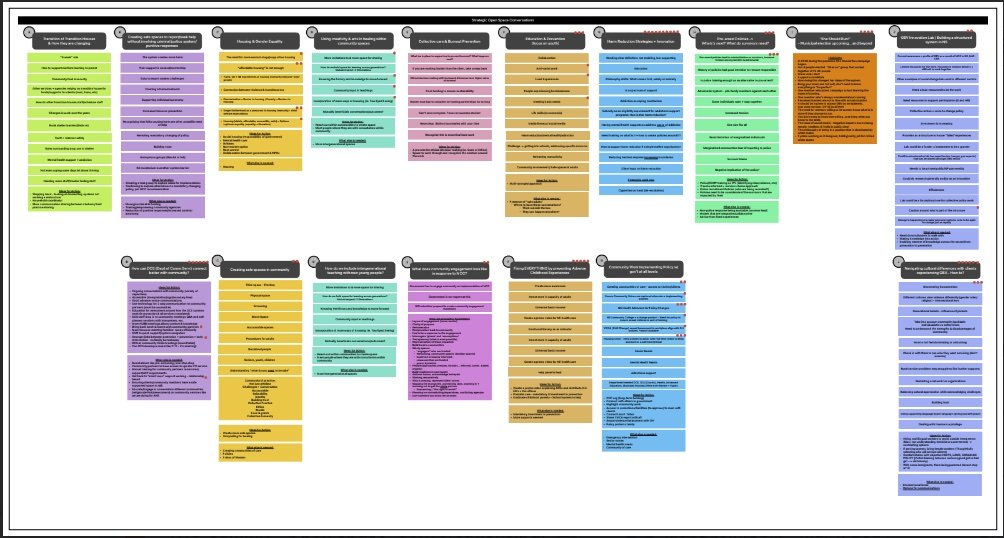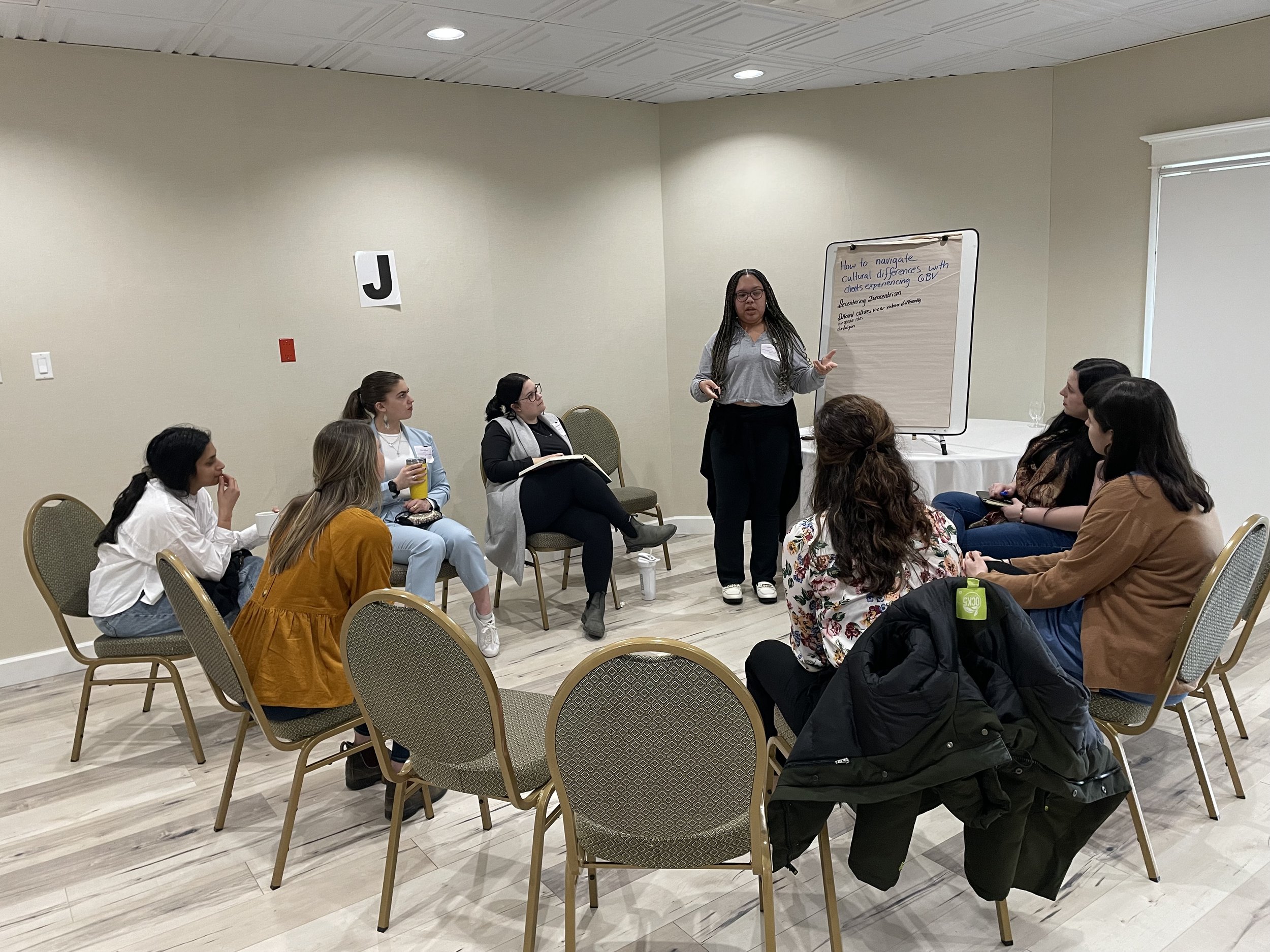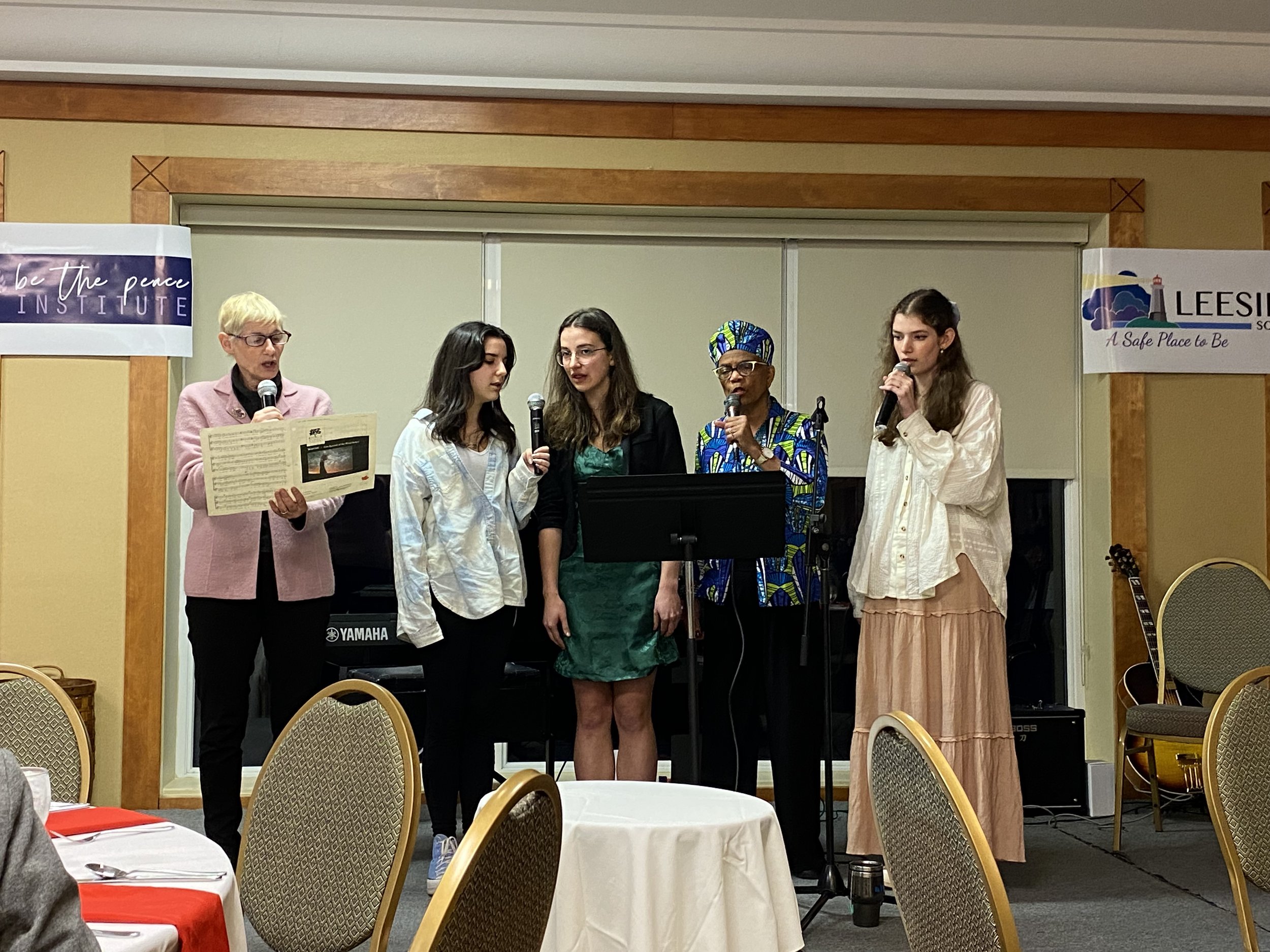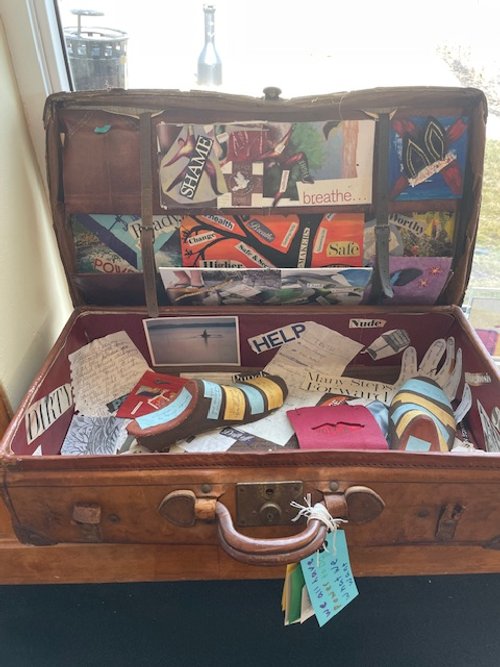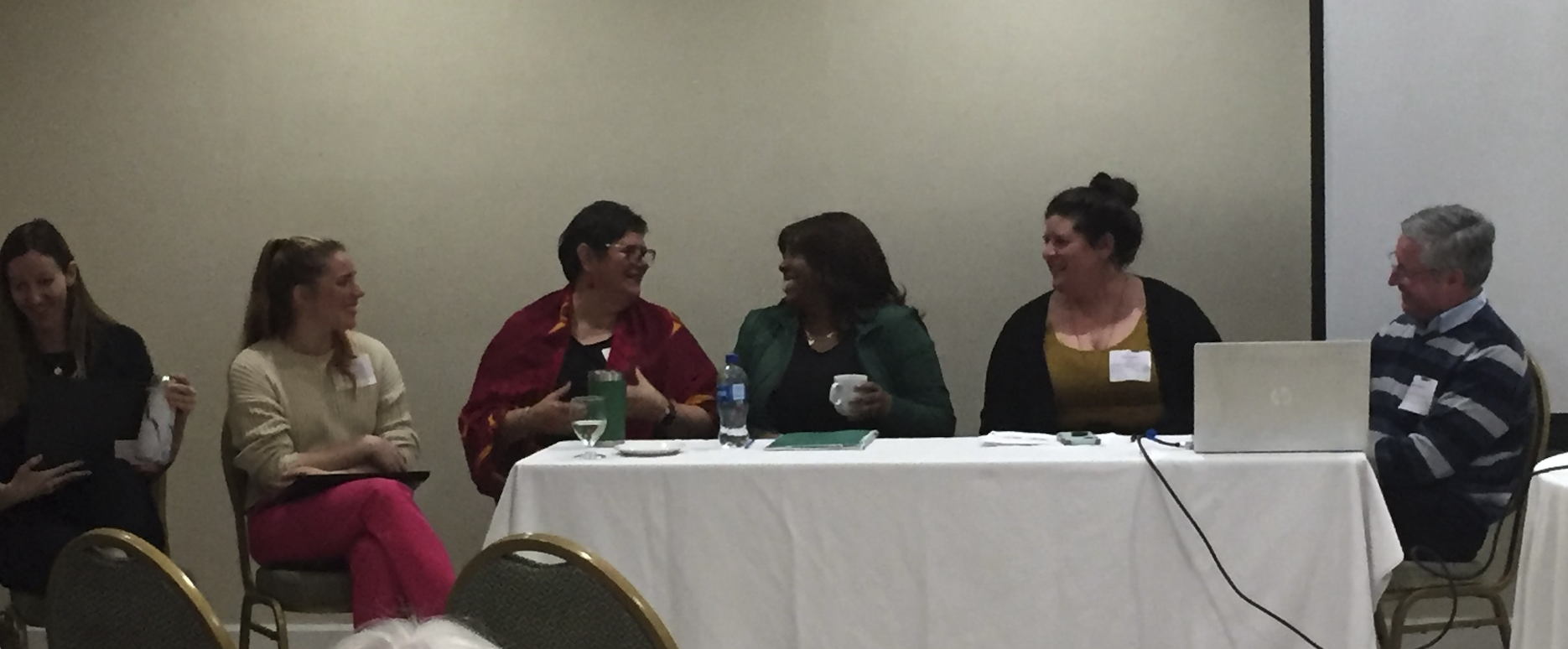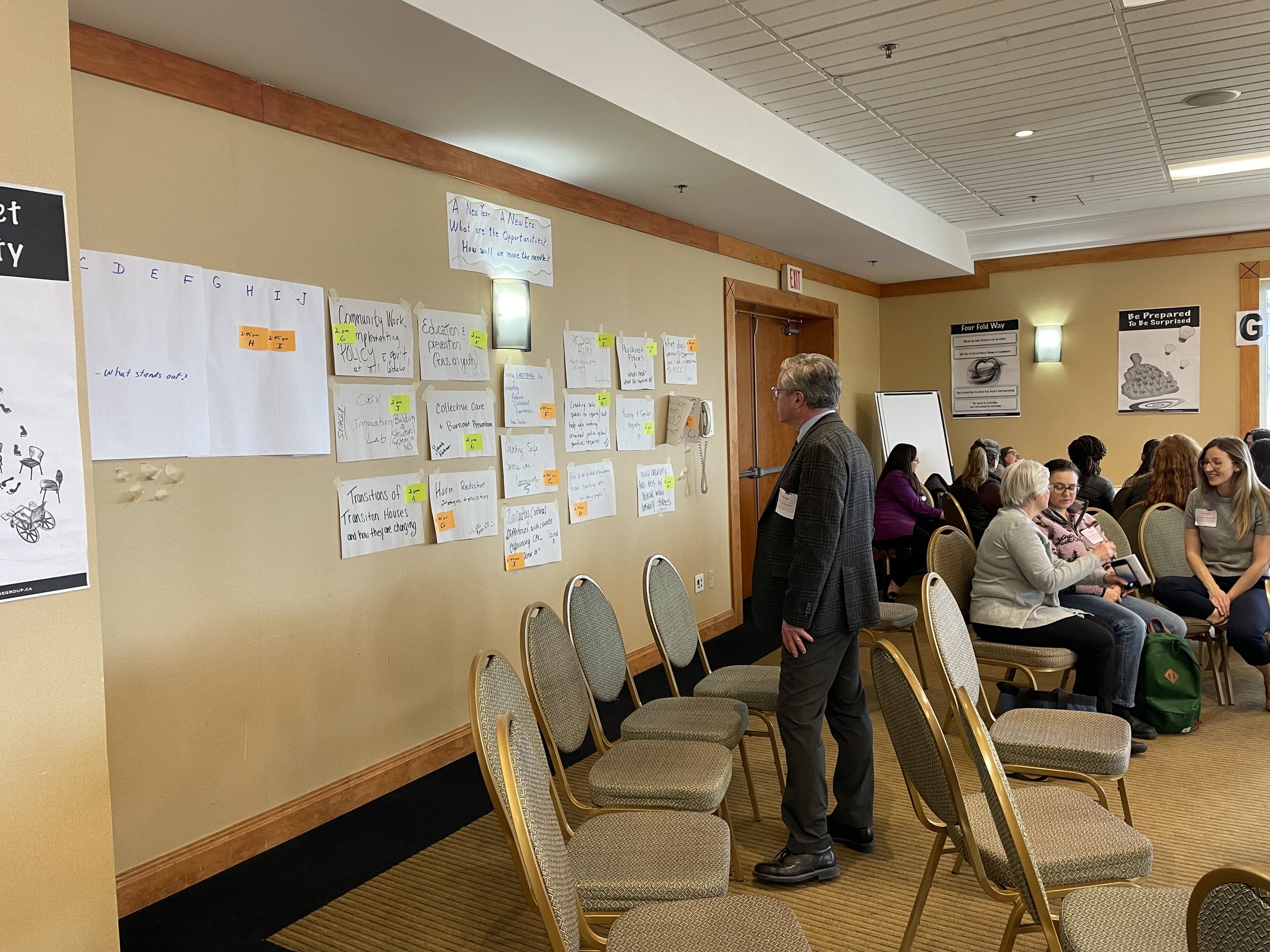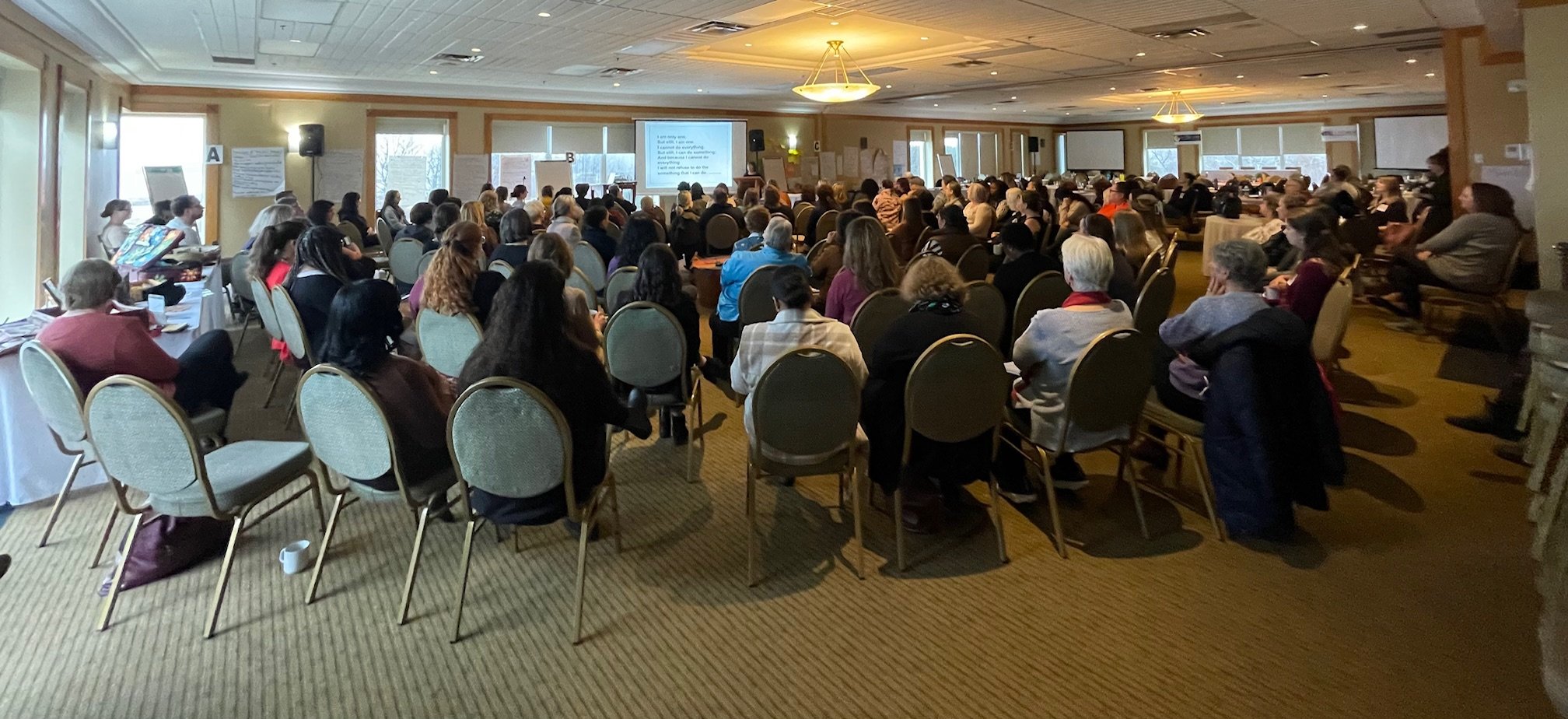IWD Summit: “A New Year… A New Era?”
Be the Peace Institute & Leeside Society
With funding from Nova Scotia Advisory Council on the Status of Women
March 6th and 7th, 2024 - Oak Island Inn and Resort, Western Shore, NS
On March 6th and 7th, with generous funding from the NS Status of Women Office, Be the Peace Institute and Leeside Society were proud to host 150 participants from across sectors at Oak Island Inn to learn, connect the dots, reflect, strategize and share on preventing and ending gender-based violence in Nova Scotia.
The diversity of sectors was impressive - from community, all 3 levels of government, academia, schools, health, justice, community services, policing, legal reform, public safety and human rights, policy, advocacy, intervention and supports, and those with lived experience.
Participants heard from diverse panelists about exciting initiatives, and engaged in highly participatory open space conversations, interspersed with art, music, poetry, film and survivour stories. Scroll on for more information, photos and outcomes from our event.
The Agenda:
Opening the Event
After a land and peoples acknowledgement, Elder Peggie Wentzell honoured us by opening the proceedings with a prayer and was joined by Denise John in singing the Strong Woman Song.
Opening Panel:
Shawna Paris-Hoyte, Executive Director, the African Nova Scotia Justice Institute
Josie McKinney, Acting Executive Director, Status of Women Office
Jennifer Glennie, Associate Deputy Minister of the Executive Council Office of the Province of Nova Scotia, coordinating of the response to the Mass Casualty Commission Report
The Honourable Wanda Thomas Bernard, Senator - Nova Scotia (East Preston)
Panelists touched on what’s inspiring them about the work at hand, persistent systemic issues, how can a gathering of people like can this support them in the work, and opportunities they are seeing to coordinate efforts across and beyond the usual silos to address systemic barriers and the path to greater collaboration. To learn more about our speakers, check out their bios here.
Sue Bookchin, BTPI moderates our first panel: (L-R) Jennifer Glennie, Josie McKinney, Shawna Paris-Hoyte
Senator Wanda Thomas Bernard, joined by zoom
The Ecosystem:
In an effort to locate ourselves and to expand our view of the many things going on, participants helped populate the eco-system map-honouring the current work, connecting the dots and identifying opportunities for collaboration and amplification.
Pat Watson and Mary Knickle sing “Woman You’ve Come a Long Way”
First Voice:
Becky Atkinson and Susanne Litke (NS Legal Aid) shared about Becky’s harrowing experience navigating both the family and criminal court systems as she was experiencing intimate partner violence with a high risk for lethality. Susanne took on Becky’s case and together, they helped her to finally escape abuse and secure custody of her child.
Some takeaways from Becky’s story included:
that while the systems are not human centred, the individuals who make up those systems sometimes offer just the right support or effective navigation - but it is usually as a result of going above and beyond their job description.
There is hope for change, both within the systems intended to respond and resolve GBV and for perpetrators themselves
The original edition of the NS Status of Women resource: “Safely on Your Way” was written by Becky Atkinson as a navigational manual to guide other women dealing with IPV, courts and child protection proceedings. Because of recent and significant changes in family law, the NS Access to Justice and NS Law Reform Institute has updated this invaluable navigation resource with all legislative and procedural changes and invited Becky to write a new forward for this essential tool.
Open Space Conversations:
Participants generated ideas and opportunities on how we will move the needle on GBV and related oppressions as an “intractable problem” and explored some key questions, including:
how will we shift the conditions that keep GBV stuck?
what sorts of opportunities might there be for new ways of collaborating or coordinating efforts in order to create better results ?
how will that make a difference?
“what if” thinking…
Closing Day 1:
After a sharing circle, Day 1 continued with entertainment over dinner from Mary Knickle and her musical youth group “Hodge Podge”, the Patricia Watson trio , and artist Rebecca Fisk who shared about on the impacts of systemic racism on her self portraits. As well, we heard from Second Story Women Centre’s Sally Hutchinson describe “A Case for Leaving”, a survivour-led art exhibit. To learn more about artists, musicians, concurrent panelists and the hosting team, click here.
Day 1 closing afternoon highlights
Ash Avery from Coverdale shares an original spoken word poem at the end of Day 1.
Mary Knickle and Patricia Watson perform with Hodge Podge
“A Case for Leaving” - survivour-led exhibit on loan from Second Story Women’s Centre.
A full evening of optional activities included:
Going Deeper: Black Films That Teach - circle conversation with Nancy Ross, filmmaker Sobaz Benjamin and Moving Forward Together project team
Freeing Your Voice - “Speaking and Singing Fun” with Mary Knickle
Expressive Art - “What IWD Means to Me” with Sally Hutchinson
Musical duo, “MidRise” - Geoff and Steve
Nancy Ross, Sobaz Benjamin, Wanda Thomas Bernard (on zoom) led us in conversation after sharing their two films from the project 'Culturally Responsive Healthcare and Gender Based Violence in African Nova Scotian Communities’.
Click image to watch Eastlink’s Black Films That Teach and the two short films - Same but Different and Woman, it’s Complicated, from the project, “Culturally Responsive GBV Care for African Nova Scotians”.
Artwork from the “Expressive Art” workshop with Sally Hutchinson
Day 2:
Day 2 began with a reading by Cora Cole from her book, "Lessons from my Grandmother" about the intergenerational resilience of women, and music from Cynthia Myers and JoAnn Wells, followed by a sharing circle on what was percolating for everyone after a very full first day.
Cora Cole reading an excerpt from her book.
Cynthia Myers and JoAnn Wells sing “Be the Peace, Make the Change,” an original piece by JoAnn.
Survivour Story: Lynn Gallant Blackburn
Lynn shared her experience seeking justice and resolution following the murder of her sister, Paula Gallant, 19 years ago. Navigating the systems felt like “living in a maze”, and again we heard that it was the exceptional individuals who reached out beyond protocol that made the difference and ultimately brought her closer to some peace and healing.
Lynn shared some ideas for positive change, including:
Fund dedicated Victim Support resources
Create a roadmap for survivours and families to navigate the systems
Program inclusion, access and support
Include first voice in systemic change efforts
Establish a national support centre for victims of murder that would house training and support for families
Concurrent Panel Discussions:
TRANSFORMING JUSTICE Moderator: Emily Tallon
No Longer On My Own (NOLOMO) -- Emily Tallon
NS Legal Aid- African Nova Scotian and Indigenous social workers -- Charnell Brooks, Crystal Hill
Restorative Approach to Multiple Proceedings (RAMP) -- Richard Derible, Kathryn Bliss, Kylee Nunn
Trafficking and Exploitation Service System (TESS) -- Kylee Nunn
CULTURAL RESPONSIVENESS Moderator: Krista Smith
Culturally Responsive GBV Care for African Nova Scotians -- Nancy Ross
YMCA GBV Prevention -- Briana Miller
Creating Communities of Care -- Rene Boudreau, Rae Boehm
Immigrant Settlement Assoc NS (ISANS) services and supports -- Wenche Gausdal, Gina Moynan
FAMILY MATTERS + A PREVENTIVE LENS Moderator: Kim Whitman-Mansfield
Priority Kids -- Angela Johnston
Public health approach to Commercial Sexual Exploitation of Children (CSEC) -- Lila Pavey
Strengthening Fathers; Caring Dads -- Alexander Davis; Gillian Morrissey
The Interprovincial VAW Research Project -- Alexa Yakubovich
YMCA Youth -- Kim Whitman-Mansfield
Transforming Justice panel (L-R): Emily Tallon, Kylee Nunn, Crystal Hill, Charnell Brooks, Kathryn Bliss and Richard Derible
Gillian Morrissey from the John Howard Society, talking about their “Caring Dads” program on the Family Matters panel.
Nancy Ross presenting in a panel on Cultural Responsiveness
Knowledge Synthesis on Key Reports:
Stacey Godsoe and Cora Cole gave a short overview of early findings on “Knowledge Synthesis & Recommendations for Action and Change” - a project with BTPI and Women’s Centres Connect to create a plain language synthesis of recent national and provincial landmark reports addressing gender-based violence for Women’s Centre Staff and the women-serving sector.
Those reports are:
Reclaiming Power and Place, the Final Report of the National Inquiry into Missing and Murdered Indigenous Women and Girls (June, 2019)
National Action Plan on Violence Against Women and Gender-Based Violence (April, 2021)
Turning the Tide Together, Final Report of the Mass Casualty Commission (March 2023)
Nova Scotia Equity and Anti-Racism Strategy (July 2023)
Report of the Inquiry into the Deaths of the Desmond Family (January, 2024)
Stacey Godsoe, BTPI sharing key themes to date from GBV reports.
Marketplace of Actions:
Facilitators Sue and Donna Clark led us through smaller group conversations to generate energy and commitment on areas ready for collaborative and individual action. Participants considered:
• What do you feel compelled to do?
• Are you willing to lead it?
• Who else will help?
• What’s the first step?
Action conversations from Day 2 of the Summit, will continue to evolve as those who championed them begin to action those intentions. We plan to keep in touch as that work moves forward so we can stay connected on these efforts.
Final Circle:
Our final circle after two very full and rich days offered opportunity for participants to consider and share what was important to them about these 2 days, what feelings they were leaving with and a key takeaway or key opportunity for action.
Sue Bookchin, BTPI, leads us through our final reflection on two very full days.
Some emerging themes:
We need to prioritize safe spaces for front line workers, and brave spaces for honest conversation.
We cannot work in silos to end GBV, it is crucial to collaborate among organizations.
People are showing up, no longer alone - we need all people at the tables, inclusive of trans and gender diverse people.
We need to understand the root causes of systemic issues, name them and then act to address them.
We know what is needed as outlined in all of the reports-
National Inquiry into Missing and Murdered Indigenous Women, Girls and 2SLGBTQQIA+ Calls for Justice,
Truth and Reconciliation Commission Calls to Action,
Donald Marshall Inquiry,
Desmond Fatality Inquiry,
Mass Casualty Commission Recommendations, and
National Action Plan to End GBV.
Need to emphasize prevention, while also addressing systemic issues and ensuring culturally responsive supports and services.
Some participant feedback:
“ “By breaking down silos, we really can work together to drive an initiative. The passion that came through the space was incredible and something that I think we’ve lacked since coming out of a pandemic.”
“How so many ideas, people’s passions were able to come forward, be shared and then to have action plans initiated. That was fantastic!!”
”I was surprised by how much joy was layered in between the grief, anger and activism.”
”Things could be more efficient if we had ongoing communication channels between our organizations.”
“I was able to make connections with old colleagues who I have not been able to see in person for a while, and create new partnerships as well. I left the summit feeling like my cup was full (in such a good way!) and I can’t wait to attend this event in the future.” ”
Final Thoughts:
We want to express our heartfelt gratitude to all who participated and for your invaluable contribution to the 2024 IWD Summit on March 6-7, 2024. Your time, energy, and wisdom profoundly enriched our collective experience.
We are diligently compiling the final report, which we aim to share in the coming weeks. We are committed to exploring avenues to sustain the dialogue and momentum. As we share and reflect on our gathering, we hold “critical hope” that the insights and momentum we generated together resonate with you and continue to shape your work and actions. The dedication to this cause across the sector inspires us, and we are determined to continue supporting and amplifying our collective efforts.
Acknowledgements
To our wonderful planning and hosting team:
Sheri Taylor and Leeside Society, and Cora Cole- for their partnership, dedication, thoughtfulness and care. It was a wonderful collaboration in pooling our collective resources and talents to pull off such a meaningful event.
Gem Roberts for her amazing tech savvy, project prowess and communications help.
Donna Clark, co-facilitator extraordinaire, and avid supporter of BTPI, bringing her open-space expertise and warmth to the design and flow of the event.
Status of Women colleagues for their ongoing allyship, dedication and funding support.
We are so grateful for you!
Sue and Stacey






